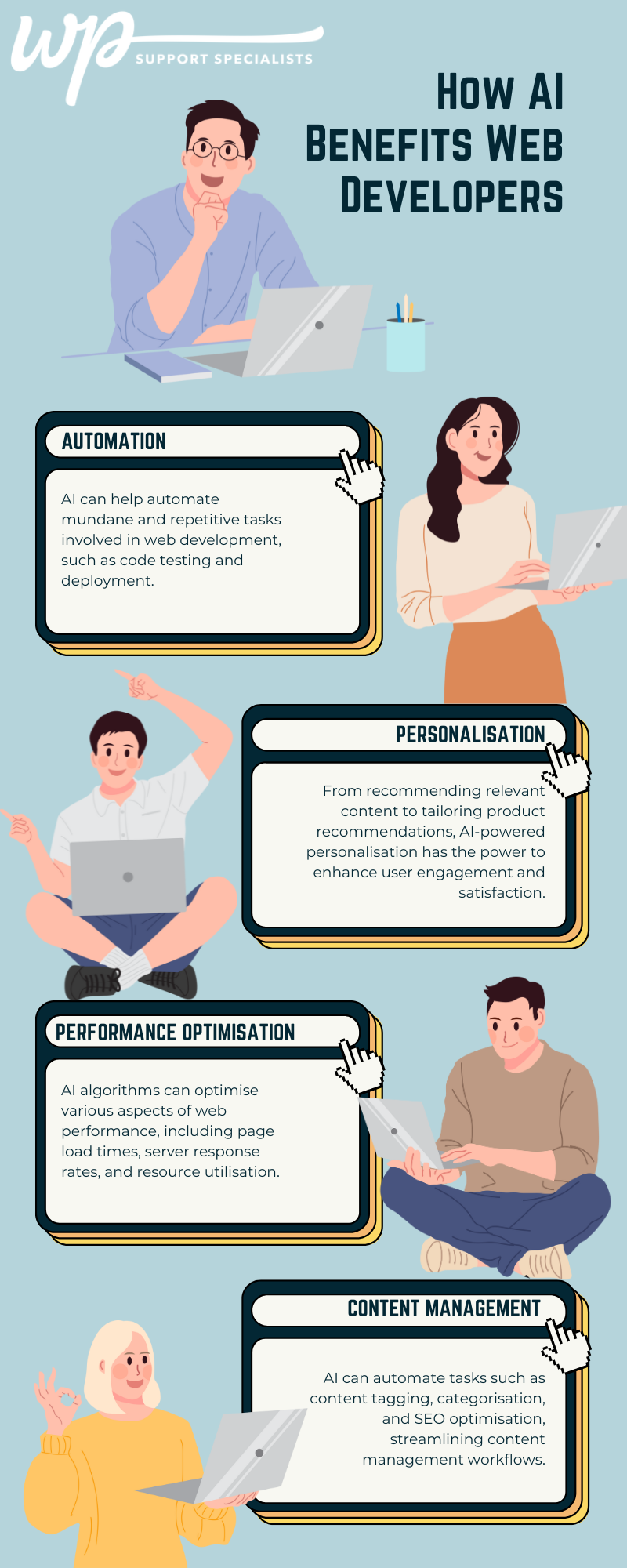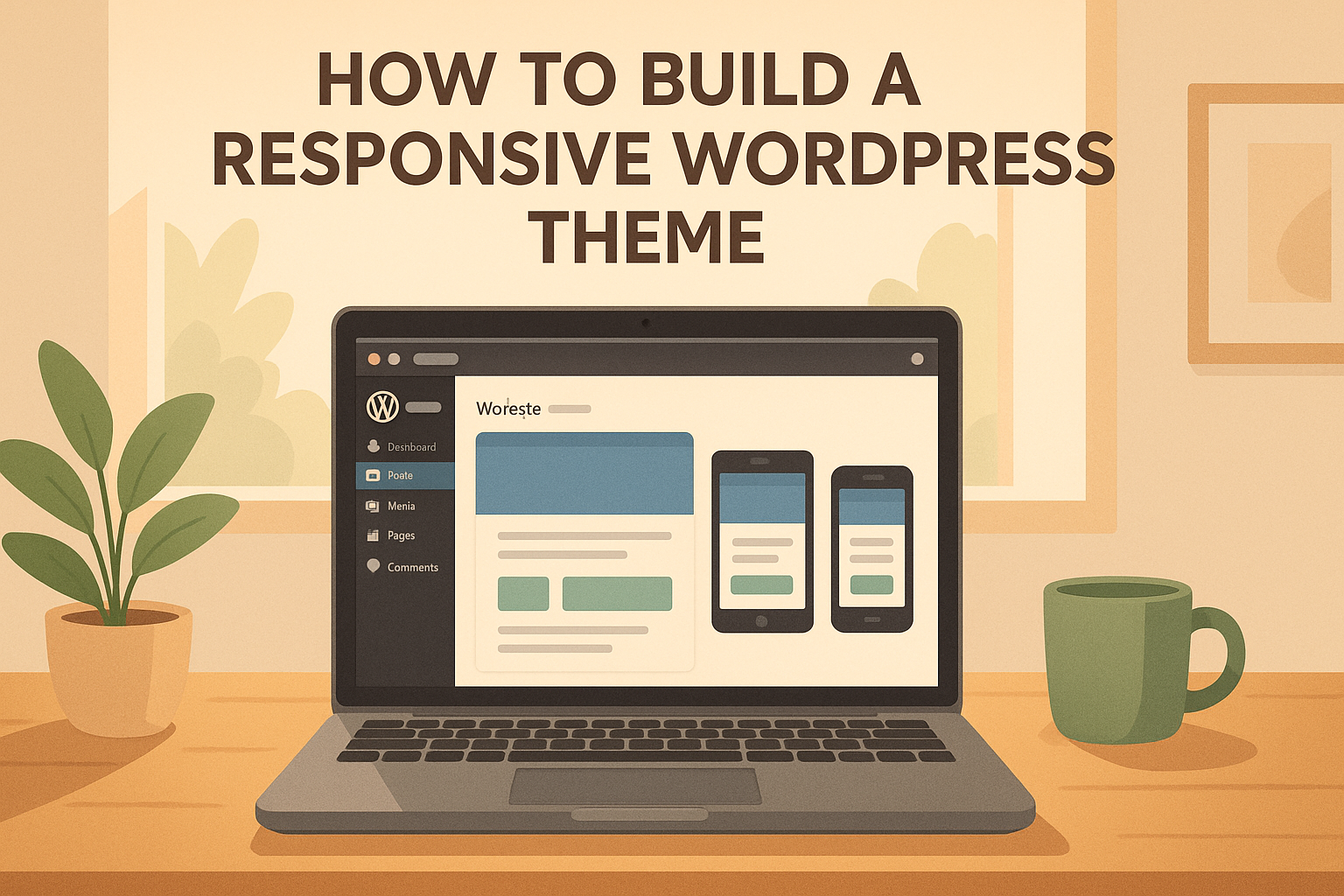Web development has been around for decades. However, now that artificial intelligence has become such a prominent part of our lives, it’s only natural to wonder about how these two worlds intersect.
There’s no denying the impressive nature of AI. It offers a new level of automation, personalisation and optimisation, but just how far can it take you when it comes to developing a new website?
In this blog, we aim to take a closer look at how AI fits in with web development and just how much you can and can’t achieve.
The Role of AI in Web Development
NewsGuard recently conducted a study that found 49 news and information websites across several languages that were generated almost entirely by AI.
While these sites were mostly dubbed content farms and were filled with advertising, it does speak to the capabilities of AI technology. Not only were these sites designed with the help of AI, but it was able to generate content on an ongoing basis too. In short, AI is capable of a lot.
The shortcuts that AI offers when it comes to web development are certainly appealing, but this doesn’t necessarily mean we should be handing over the reins just yet.
Businesses that want their websites to work in their favour need to focus on generating original, user-friendly designs and content that is based on real opinions and human stories. This is especially important when it comes to search engine optimisation.
AI and Web Developers Working Together
So, how should we be using AI during the web development process and after the launch of a website?
- Automation of Repetitive Tasks: AI can help automate mundane and repetitive tasks involved in web development, such as code testing and deployment. By leveraging machine learning algorithms, AI tools can streamline these processes, reducing human effort and errors.
- Enhancing the User Experience through Personalisation: AI algorithms analyse user data, preferences, and behaviour patterns to deliver personalised experiences on websites and applications. From recommending relevant content to tailoring product recommendations, AI-powered personalisation has the power to enhance user engagement and satisfaction.
- Performance Optimisation: AI algorithms can optimise various aspects of web performance, including page load times, server response rates, and resource utilisation. By analysing data in real-time and making dynamic adjustments, AI helps websites maintain optimal performance levels even under fluctuating traffic conditions.
- Streamlining Content Management: AI-driven content management systems (CMS) can facilitate content organisation and delivery on websites. These systems utilise natural language processing (NLP) and machine learning algorithms to automate tasks such as content tagging, categorisation, and SEO optimisation, streamlining content management workflows.
Limitations of AI in Web Development
As impressive as AI is, there are still a few areas where it falls short. It’s these areas where human intervention is still required in terms of web development.
Lack of Creativity and Intuition
While AI excels at performing tasks based on predefined rules and patterns, it lacks the creativity and intuition that only humans can bring to the table.
This limitation becomes particularly apparent in tasks that require innovative problem-solving or the generation of original content. This is where human judgment and creativity are irreplaceable.
Ethical Concerns
AI algorithms are prone to biases based on the data they are trained on. The result can be unintended discrimination, which can harm your brand.
In web development, biased algorithms may lead to the unfair treatment of website users based on factors such as race, gender, or socioeconomic status. You may also run into ethical concerns when it comes to user profiling, data privacy, and surveillance.
Dependency on Quality Training Data
The quality and diversity of the data that’s used to train AI bots play an important role in their performance.
Insufficient or biased training data can lead to inaccurate predictions and poor website performance. What’s more, maintaining large datasets can be costly and resource-intensive, which can create challenges for smaller organisations and startups.
Complexity of Human Interaction and Communication
While AI-powered chatbots and virtual assistants have become increasingly popular in web development, they still struggle to understand and respond to complex human interactions and nuances in communication.
Natural language processing (NLP) models may misinterpret user queries or fail to provide satisfactory responses, leading to frustration and dissatisfaction among your website users.
To address these limitations, it’s necessary to combine the strengths of AI with human intervention. This way, developers can harness AI’s potential while ensuring a unique and inclusive online experience.
AI and Web Development: Exploring the Possibilities
AI won’t be taking over web development any time soon. However, more and more developers, marketers and business owners are realising how they can use AI capabilities to their advantage.
Here is some of what we can expect to see more of going forward:
eCommerce Sales Optimisation
A number of eCommerce businesses are and will be relying on AI to increase sales and conversions.
Through the power of personalisation, AI can provide customers with an experience that is unique to their needs and pain points. While businesses shouldn’t rely solely on AI to generate content, it can be a great ally when it comes to generating content that customers want to engage with thanks to data collection and analysis.
It can even be used to better understand what products should potentially be discontinued and what items should be incorporated into your offering.
Lastly, AI is and will continue to be an excellent tool for inventory management, pricing optimisation and the roll-out and management of customer loyalty programs.
Here are a few examples of how AI tools are changing the eCommerce game:
Artificial Design Intelligence
Web developers and business owners know their brands best, so will always take the lead when it comes to designing their online platforms and apps.
However, this can be done in partnership with AI in the form of artificial design intelligence. As AI learns more about your brand and customers, it can suggest design changes and functionality that speak to your users’ preferences. This way, you can gradually build and alter your online platforms to provide the best possible experience for your customers.
Wix ADI is a great example of this. It’s a tool that helps businesses come up with unique websites based on the inputs of different types of users.
Even though website builders like this make the process of developing a site that much easier, it’s still important to be directly involved in the development of your site at a deeper level. This way, should anything go wrong or quick changes need to be made, it’s possible to make updates as quickly as possible.
Content Optimisation
There is a lot of debate about whether you should be using AI for content creation. As much as AI is more than capable of generating content, it cannot replace the human element in terms of adding in real stories, personal anecdotes and local nuances.
With this being said, AI is an excellent tool for content optimisation. AI algorithms can analyse user data such as browsing history, demographics, and past interactions to deliver personalised content recommendations.
AI algorithms can also dynamically adjust content elements such as headlines, images, and calls-to-action based on user interactions and preferences. Website owners can use AI-driven personalisation tools to deliver relevant content variants to different audience segments.
Then there’s SEO optimisation. By collecting user behaviour patterns, AI can help you identify keywords, optimise meta tags, and improve your overall SEO performance.
Lastly, AI algorithms can analyse user-generated content such as comments, reviews, and social media posts to gauge sentiment and identify trends. Website owners and developers can then use this data to monitor customer feedback, identify potential issues or opportunities, and tailor their content and messaging accordingly.
If you’re like us and you love all things WordPress, here are a few AI-based plugins you can consider for your site:
Website Performance Enhancement
As more web developers and business owners embrace AI, we will see an emphasis on website performance enhancement.
AI can be used to enhance your website performance by using data-driven insights and automation to increase traffic and boost sales.
AI-driven predictive analytics algorithms can anticipate user behaviour, trends, and preferences. By analysing historical data and real-time interactions, businesses can make data-driven decisions regarding content creation, marketing strategies, and product development, optimising their offerings to meet evolving customer needs and expectations.
There are also AI tools that facilitate image compression, caching, and resource prefetching, all of which can boost the performance of your site.
Final Words
Artificial intelligence is not replacing web developers. Instead, it’s being used as an essential tool, ensuring developers can create websites that meet the specific needs of customers and users.
The human element of web development, optimisation and marketing in general will always be required. It’s about working with AI’s strengths to enhance web development efforts to create a more engaging brand experience.
If you’re looking for guidance or assistance with creating a more intuitive user experience for your customers, contact WordPress Support Specialists.








